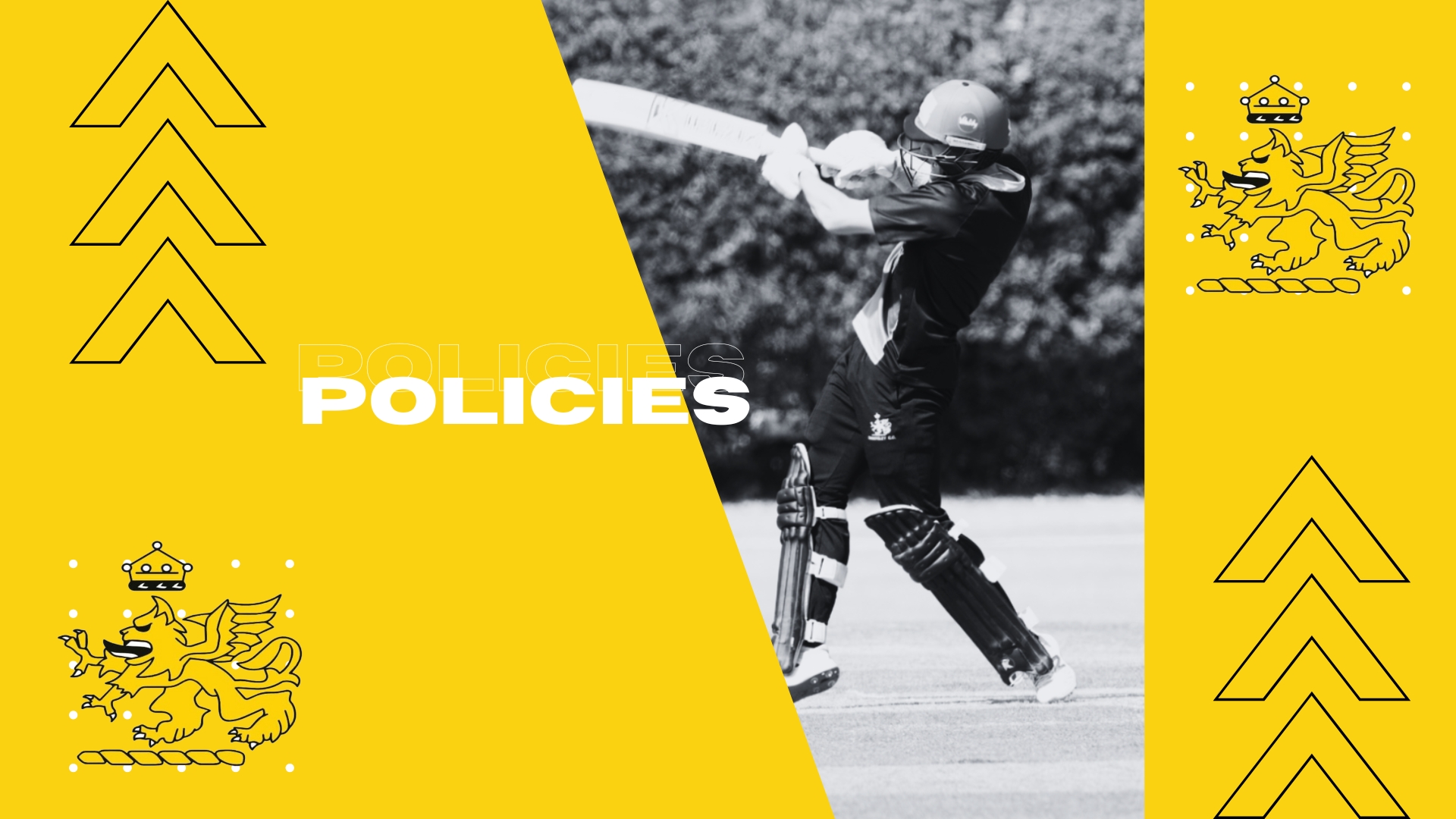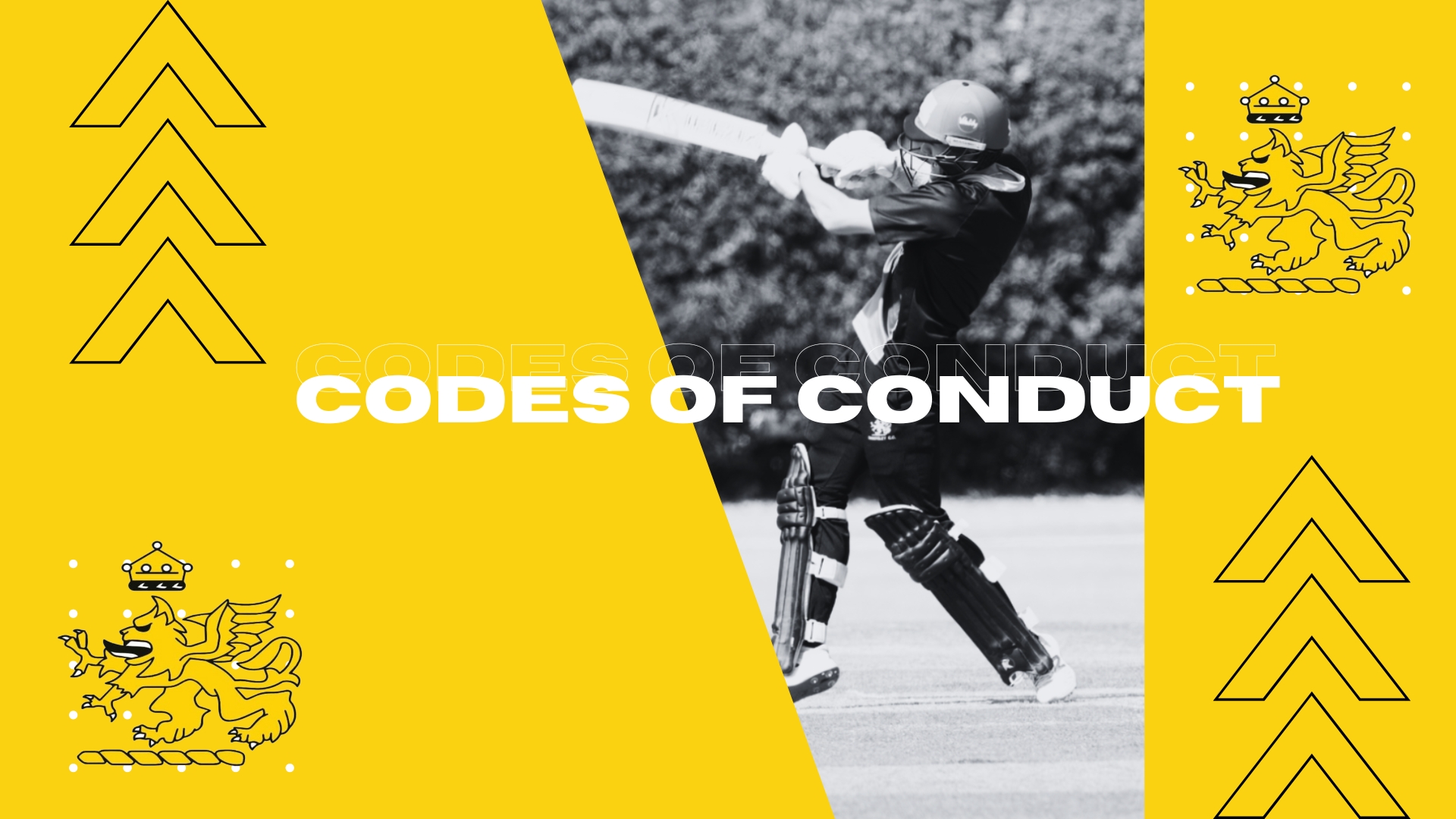PLEASE NOTE: All codes and policies can also be found in the 'Information' then 'Documents' tab on our website.
Code of Conduct for Members and Guests
All Members and Guests of Ombersley Cricket will:
- Respect the rights, dignity and worth of every person within the context of Cricket and Bowls
- Treat everyone equally and not discriminate on the grounds of age, gender, disability, race, ethnic origin, nationality, colour, parental or marital status, religious belief, class or social background, sexual preference or political belief
- Not condone, or allow to go unchallenged, any form of discrimination if witnessed
- Display high standards of behaviour
- Promote the positive aspects of cricket and bowls, for example fair play
- Encourage all participants to learn the Laws and rules and play within them, always respecting the decisions of match officials
- Actively discourage unfair play, rule violations and arguing with match officials
- Recognise good performance not just match results
- Place the well-being and safety of young people above the development of performance
- Ensure that activities are appropriate for the age, maturity, experience and ability of the individual
- Respect young people’s opinions when making decisions about their participation in cricket and bowls
- Not smoke, drink or use banned substances while working with young people in the club
- Not provide young people with alcohol when they are under the care of the club
- Follow ECB guidelines set out in the “Safe Hands – Cricket’s Policy for Safeguarding Children” and any other relevant guidelines issued
- Report any concerns in relation to a child, following reporting procedures laid down by the ECB
In addition to the above, all club officers and appointed volunteers will:
- Have been appropriately vetted, if required
- Hold relevant qualifications and be covered by appropriate insurance
- Always work in an open environment
- Inform players and parents of the requirements of cricket and bowls
- Know and understand the ECB’s “Safe Hands – Cricket’s Policy for Safeguarding Children”
Members and Guests include all members and officers of the cricket club and all guests of those members and officers, as well as all individuals who watch, attend, and participate in matches hosted by the club in whatever capacity.
Code of Conduct for Officials and Volunteers
The essence of good ethical conduct and practice is summarised below.
All volunteers must:
- Consider the well-being and safety of participants before the development of performance.
- Develop an appropriate working relationship with performers, based on mutual trust and respect.
- Make sure all activities are appropriate to the age, ability and experience of those taking part.
- Promote the positive aspects of the sport (e.g. fair play)
- Display consistently high standards of behaviour and appearance.
- Follow all guidelines laid down by the national governing body and the Club.
- Hold the appropriate, valid qualifications and insurance cover.
- Never exert undue influence over performers to obtain personal benefit or reward.
- Never condone rule violations, rough play or the use of prohibitive substances.
Code of Conduct and Rules for Young People
Code of Conduct and Rules for Young People
Ombersley Cricket Club is fully committed to safeguarding and promoting the wellbeing of all its members.
Ombersley Cricket Club believes that it is important that members, coaches, administrators, parents, carers or guardians associated with the club should, at all times, show respect and understanding for the safety and welfare of others.
Therefore, members are encouraged to be open at all times and to share any concerns or complaints that they may have about any aspect of the club with our Club Secretary, Kevin Davies (07887 501055) or Junior Section Chairman, Ed McCabe (07748 337880).
As a member of Ombersley Cricket Club you are expected to abide by the following junior code of conduct :
- All members must play within the rules and respect officials and their decisions.
- All members must respect the rights, dignity and worth of all participants regardless of gender, ability, cultural background or religion.
- Members should keep to agreed timings for training and competitions or inform their coach or team manager if they are going to be late.
- Members must wear suitable kit for training and match sessions, as agreed with the coach/team manager.
- Members must pay any fees for training or events promptly.
There are no fees for training sessions at any age group. However, for organised league or friendly matches, match fees are payable from Under 10s upwards at £2.00 per match or £3.00 for U11, 12 and 13 County League Sunday morning matches (with a League umpire).
- Junior members are not allowed to smoke on club premises or whilst representing the club at competitions.
- Junior members are not allowed to consume alcohol or drugs of any kind on the club premises or whilst representing the club.
Code of Conduct for Parents and Carers
- Encourage your child to learn the rules and play within them.
- Discourage unfair play and arguing with officials.
- Help your child to recognise good performance, not just results.
- Never force your child to take part in sports.
- Set a good example by recognising fair play and applauding the good performances of all.
- Never punish or belittle a child for losing or making mistakes.
- Support your child's involvement and help them to enjoy their sport.
- Use correct and proper language at all times.
Groundcare Code of Conduct
Introduction
Without groundsmen, there would be no games. It is important to remember that most clubs do not have a full-time groundsman but that the work is done by volunteers who do it when time permits and budgets allow. Groundsmen cannot control the weather and that, combined with the amount of covering a club can provide, significantly influences the type of pitch that may be produced.
What is usually never in doubt is the effort and commitment that groundsmen, whether full-time or part-time, paid or unpaid, put into their work. As a player, you can make life easier for groundsmen by following the guidelines set out below, as they will be able to spend more time on essential activities rather than repairs or damage caused by thoughtlessness.
Respect for the Square
Under no circumstances should any marks or scratches be made on the square to indicate where your fielding position is. Instead, you should line up each set of stumps with features on the boundary, such as benches, trees etc. When both sets of stumps are lined up you will be in the correct place.
When running between the wickets, you should attempt to get off the pitch as early as possible and run up the side of the adjacent pitch. Conventionally, each batsman should run on different sides of the pitch. This will reduce damage to the pitch, the chances of collision and of being warned about running down the middle of the pitch with the possible loss of 5 runs from your score.
When taking guard, it is less damaging to the pitch to use the toe of the bat to make your mark, and then if necessary to use your spikes to scratch a line towards the stumps. Scratching lines away from the stumps, across the popping crease, means batsmen stand on the marks, causing them to be lost, which means they need to be re-done, so creating deeper holes.
Wicketkeepers have a habit of scratching a line behind the stumps when standing up to the wicket. It is not clear when in the bowlers’ delivery they look at this line but it does make a mess.
When fielding anywhere on the square, avoid walking in the bare parts, which are usually the ends of pitches and which often have been repaired. Constant walking through these areas makes it more difficult for the grass to recover.
Never practice on any part of the square without the groundsman’s permission. A pitch may appear to have been finished with but the groundsman may well be intending to use it later in the season.
If you displace turf when fielding, replace the divot.
If, when you go look at the pitch before a game, you find that the square is wet, avoid bare areas as these will be very sticky, and then come off the square as soon as possible.
Never walk on tarpaulins or other groundsheets in spikes. You will puncture them, make them ineffective and cause considerable time and expense in repairs or replacement.
Never play games too close to the square so that you can keep away from it as much as possible
Respect for the Outfield
When marking out your run up when you have been given a marker, do not scrape the outfield with your spikes and then put the marker down. The result of this is a series of indentations in the ground which can create unevenness and fielding difficulties. A groundsman will usually be prepared to mark the end of your run-up with a white line.
When fielding in the outfield, do not mark your position by spinning on your spikes. Instead, you should line up each set of stumps with features on the boundary, such as benches, trees etc. When both sets of stumps are lined up you will be in the correct place.
If you slide when fielding in the outfield and dislodge any turf, reposition the divot.
If you take a water bottle to the boundary, do not leave it there at the end of the game but remember to take it back to the pavilion and dispose of it in a bin.
Please do not wheel your cricket bags across the outfield as this damages the grass and leaves a trail
Always use the bowling markers provided and do not scratch your run-up mark with spikes.
Respect for the Practice Area
Always leave the practice areas, such as the nets, as you would wish to find them. This means taking away any drink bottles and/or food wrappers/containers, returning stumps to the pavilion, reporting any damage to netting etc.
You should never enter practice areas if they are roped off, have ‘keep off the grass’ signs or similar without first getting permission from the groundsman
Never use spikes on artificial nets or wickets; always use trainers or other rubber soled shoes.

Privacy Policy and Data Protection
OMBERSLEY CRICKET CLUB PRIVACY STATEMENT
At Ombersley Cricket Club, we have always taken great care to respect the security of any personal information which we hold on to our members.
We will not share your information with others, except for legitimate purposes in connection with your involvement in the activities of the Club and will only keep and use personal information which will help us to provide a better service for our members.
To reflect the recent changes in data protection law, we have updated our Privacy Notice.
About Us
Ombersley Cricket Club (“OCC”) is an unincorporated members’ association. OCC is the data controller under data protection legislation.
What data we will collect
In becoming a member of OCC, OCC will collect certain information about you which could include your name, date of birth, gender, ethnic origin, home address, e-mail address, telephone number and any medical conditions that we should be aware of. We will also collect the names and telephone numbers of two emergency contacts nominated by you.
Why we will collect it
We will collect and process your data for the purposes of registering you as a member of OCC and administering your involvement in the sport of cricket and/or bowls and/or in the social activities of OCC. The legal basis on which we will process your data is on the basis of legitimate interests. The legitimate interests are the interest of registering you as a member and administering your involvement as stated.
We shall also at the point of collection of the data obtain your consent to the collection and processing of your data. How long we will keep it.
We will not retain your personal data for longer than is reasonable and necessary for the purposes for which it was collected. We shall retain your personal data for such time as you are registered with OCC as a member. Two years after you cease to be a member of OCC or play an active part in OCC, we shall delete your data.
Sharing your data
In order to achieve the purposes (as explained above) for which the data is collected, we may need to share your data with other organisations, such as relevant sporting governing bodies, leagues, county boards or associations and/or other competition organisers. If you have any concerns about the way that your personal data is processed by any of these organisations, you should contact them direct to obtain information regarding their compliance with data protection legislation.
OCC shall also need to share your personal data with its club committee officials and/or coaches and managers for the purpose of administering the processing of membership records and payments, competition entries, training, matches, website management, to provide information about the club’s activities and social/fundraising events and information about club sponsors.
Your Rights
You have the following rights under data protection legislation :
- to be informed about your personal data held by OCC
- to access your personal data held by OCC
- to object to, or restrict, the processing of your personal data
- in certain circumstances, to have inaccurate personal data rectified, removed or destroyed
- to prevent processing for direct marketing
- to object to decisions being taken by automated means
- to claim compensation for damages caused by a breach of data protection legislation. Concerns / Complaints
If you have any concerns or complaints in relation to how OCC collects and/or processes your personal data, you should contact OCC’s Data Protection Officer (Kevin Davies — kevinsdavies@aol.com or 07887 501055) in the first instance. If you are dissatisfied with how your concern/complaint is dealt with by OCC, you have the right to report your concern/complaint to the Information Commissioner’s Office (www.ico.org.uk)
Safe Guarding Policy
Ombersley Cricket Club (“The Club”) is committed to ensuring that all Children (meaning all persons under the age of 18) participating in cricket have a safe and positive experience.
We will do this by:
Recognising all children participating in cricket (regardless of age, gender, race, religion, sexual orientation, ability or disability) have the right to have fun and be protected from harm in a safe environment.
Ensuring individuals working within cricket at, or for, the Club provide a welcoming, safe, positive and fun environment for children.
Adopting and implementing the England and Wales Cricket Board (ECB) “Safe Hands – Cricket’s Policy for Safeguarding Children” and any future versions of this.
Appointing a Club Welfare Officer and ensuring they attend all current and future training modules required by the ECB, so that they have the necessary skills to undertake their role effectively.
Ensuring all people who work in cricket at, or for, the Club (such as staff, officials, volunteers, team managers, coaches and so on) have a responsibility for safeguarding children, and understand how the “Safe Hands Policy” applies to them according to their level of contact with children in cricket.
Ensuring all individuals working within cricket at, or for, the Club are recruited and appointed in accordance with ECB guidelines and relevant legislation.
Ensuring all individuals working within cricket at, or for, the Club are provided with support, through education and training, so they are aware of, and can adhere to, good practice and
Code of Conduct guidelines defined by the ECB and the Club
Ensuring the name and contact details of the Club Welfare Officer are available:
Providing an environment where the views of children, parents and volunteers are sought and welcomed on a range of issues and providing everyone connected with the Club (including parents, children and volunteers) with the opportunity to voice any concerns they have (about possible suspected child abuse/neglect, and/or about poor practice) to the Club Welfare Officer.
Ensuring all suspicious concerns and allegations are taken seriously and dealt with swiftly and appropriately.
Ensuring access to confidential information relating to child safeguarding matters is restricted to those who need to know in order to safeguard children – including the Club Welfare Officer and the appropriate external authorities, such as the Local Authority Designated Officer (LADO), as specified within ECB child safeguarding procedures.
- As the first point of contact for parents, children and volunteers/staff within the Club
- As a local source of procedural advice for the Club, its committee and members
- As the main point of contact within the Club for the ECB County Welfare Officer and the ECB Safeguarding Team, and
- As the main point of contact within the Club for relevant external agencies in connection with child safeguarding.
Ensuring correct and comprehensive reporting procedures exist for raising and managing child safeguarding concerns.
April 2016
Reviewed April 2020
Next Review April 2025
Anti- Bullying Policy
Anti-Bullying Policy
Statement of Intent
We are committed to providing a caring, friendly and safe environment for all of our children so they can train, and play, in a relaxed and secure atmosphere. Bullying of any kind is unacceptable at our club. If bullying does occur, all children should be able to tell, and know, that incidents will be dealt with promptly and effectively. We are a TELLING club. This means anyone who knows bullying is happening is expected to tell someone who can do something about it.
What is bullying?
Bullying is the use of aggression with the intention of hurting another person. Bullying results in pain and distress to the victim.
Bullying can take many forms:
- Emotional: being unfriendly, excluding, tormenting (for example hiding kit or making threatening gestures)
- Physical: pushing, kicking, hitting, punching or any use of violence
- Racist: racial taunts, graffiti and/or gestures
- Sexual: unwanted physical contact or sexually abusive comments
- Homophobic: because of, of focusing on, the issue of sexuality
- Verbal: name-calling, sarcasm, spreading rumours and teasing
- Cyber: bullying behaviour online or via electronic communication (e-mail and text, social media, etc.) or misuse of associated technology, such as camera and video facilities
- All adults and children at the Club should have an understanding of what bullying is
- All officials, coaching and non-coaching staff should know what the Club policy is on bullying and follow it when bullying is reported
- All children and parents should know what the Club policy is on bullying and what they should do if bullying arises
- As a Club, we take bullying seriously. Children and parents should be assured they will be supported when bullying is reported
- Bullying will not be tolerated.
- Says they are being bullied
- Changes their usual routine
- Is unwilling to go to the Club
- Becomes withdrawn, anxious or lacking in confidence
- Comes home with clothes torn or belongings damaged
- Has possessions which are damaged or go missing
- Asks for money or starts stealing money (to pay the bully)
- Has unexplained cuts or bruises
- Is frightened to say what’s wrong
- Gives improbable excuses for any of the above.
- Starts stammering
- Cries themselves to sleep at night or has nightmares
- Becomes aggressive, disruptive or unreasonable
- Is bullying other children or siblings
- Stops eating
- Attempts or threatens suicide or runs away.
- Report bullying incidents to the Club Welfare Officer
- In cases of serious bullying, the incidents will be reported to the ECB Safeguarding Team for advice via the County Welfare Officer
- Parents should be informed and invited to a meeting to discuss the problem
- If necessary, and appropriate, police will be consulted
- The bullying behaviour or threats of bullying must be investigated and the bullying stopped quickly
- An attempt will be made to help the bully (bullies) change their behaviour.
- Developing a children’s Code of Conduct
- Agreeing behaviour contracts
- Having discussions about bullying and why it matters.
Why is it important to respond to bullying?
Bullying hurts. No one should be a victim of bullying. Everyone has the right to be treated with respect. Children who are bullying also need to learn different ways of behaving.
Cricket clubs have a responsibility to respond promptly, and effectively, to issues of bullying.
Objectives of this Policy
Signs and Symptoms
A child may indicated, by signs or behaviour, that he or she is being bullied. Adults should be aware of signs and investigate if a child:
In more extreme cases, the child:
These signs and behaviours could indicate other problems but bullying is a possibility and should be investigated.
Procedures
In cases of adults reported to be bullying cricketers under 18, the ECB must always be informed and will advise on action to be taken.
Prevention
We will use ‘Kidscape’ recommended methods to help children prevent bullying. These may include:
With thanks to Kidscape for their expert advice and templates.
Photography Policy
The Club is keen to promote positive images of children playing cricket and is not preventing the use of photographic or video equipment. However, some people may use sporting events as an opportunity to take inappropriate photographs or film footage of children and to avoid such risks the following policy shall be followed:
- Photographs/images are not to be taken at matches or training without the prior permission of the parents/carers of the child. This permission can be given by proxy by the coach of each team only after parental consent for has been granted. The coach must arrange this prior to attending matches
- If no consent has been given for a child, then it is to be made known to the relevant person of the other team (e.g. coach/team manager) so that the appropriate person/s taking photographs for the other team is/are aware and can avoid taking photographs of that particular child
- Parents should not be prevented from taking pictures of or filming, their children. These are normal family practices and help mark milestones in a child’s life. The introduction of proportionate controls on the use of photographic equipment (cameras and videos, including those on mobile phones) is part of general safeguarding good practice in the Club
- The children should be informed that a person will be taking photographs
- The children should be informed that if they have concerns they can report these to the coach or team manager
- Concerns regarding inappropriate, or intrusive, photography should be reported to the Club Welfare Officer and recorded in the same manner as any other child protection concern
- Permission of the parent/carer shall be obtained to use their child’s image and, wherever possible, the image should be shown to the parents/carers and the child in advance
- If an image is used, naming the child is avoided
- Video can sometimes be used as a legitimate coaching aid. All material shall be stored securely and deleted or destroyed when a parent requests this or when no longer needed. The parents/carers and children over 12 years old must provide written consent for the use of photography and video analysis.
The reporting of inappropriate use of images of children is encouraged. If you are concerned, report your concerns to the Club Welfare Officer or the County Welfare Officer.
Sponsors








